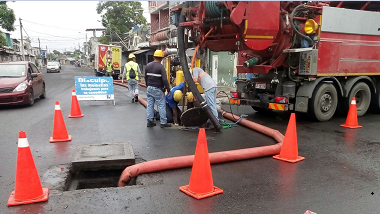
Counter-guarantee for exporters
Additional safeguard for exporters
Counter-guarantee - More flexibility and room for maneuver
As one of 6 measures within the package of measures, the volume of guarantees will be increased by the Federal Government. This gives German exporters more flexibility and room for maneuver in their foreign business. The expansion creates financial leeway for new business and has a positive impact on Germany as an industrial location and the German labor market. For example, companies in large-scale transformer plant construction will benefit from new market and growth opportunities in the energy sector and in climate protection. The counter-guarantee is a decisive step towards securing and expanding the competitiveness of German companies.
Get in touch with our contact persons:

Advantages for new opportunities with the counter-guarantee
Our comprehensive package of measures considerably improves the possibilities for using the counter-guarantee. With a general increase in the maximum amount from EUR 80 million to EUR 120 million per exporter, we offer you extended opportunities to secure and promote your export transactions:
- Increased maximum amount: the maximum guarantee volume is raised to EUR 120 million per exporter.
- Flexibility for eligible transactions: A higher maximum amount is set on a case-by-case basis for particularly eligible transactions, e.g. in the area of energy transition.
- Support for transformation and resilience: Promotion of transactions that contribute to climate transformation and the strengthening of technological sovereignty.
Why the counter-guarantee has been optimized
Exporters are reporting an increased need for guarantees due to general and inflation-related increases in order values. We have adapted the counter-guarantee to meet these requirements:
- Adjustment to market conditions: Increase in the maximum amount due to increased order values in recent years.
- Targeted support: Support for large-volume and eligible transactions to strengthen resilience and technological sovereignty.
- Temporary increases: Compensating for market weaknesses by temporarily increasing the maximum amount if there is a proven need.
We support you in the additional provision of bonds
If you as exporter are required to put up contract bonds for an export transaction, the guarantor who is asked to issue the bond on your behalf will then charge your credit line with the relevant bond amount. Often the guarantor requests you to provide adequate security – for instance in the form of a charge over cash collateral. Depositing such security may in turn lead to a reduction of your liquidity.
Federal government pays refunds in the event of a drawdown
With the counter-guarantee, the Federal Government undertakes to reimburse the guarantor for a large part of the amount that the latter must pay to the foreign buyer (policyholder) if the contract bond is called. To the extent of the counter-guarantee, the Federal Government therefore relieves the guarantor of the risk that it will not be able to enforce its claim for reimbursement of expenses against the exporter - which arises when and to the extent of the guarantee payments. The counter-guarantee thus relieves the guarantor to a considerable extent of his (recourse) risks. This relief not only enables the guarantor to dispense with further - liquidity-restricting - collateral from the exporter, but also not to offset the amount guaranteed by him against the exporter's credit line to the extent of the counter-guarantee. This is ultimately intended to make it easier for the exporter to provide the guarantee required by the foreign buyer.
Good to know: The counter-guarantee is a supplement to contract bond cover.
Counter-guarantee at a glance
Target group
- as applicant: German export companies
- as beneficiaries of the counter-guarantee:
German credit institutions / surety insurers
Branches of foreign banks / surety insurers based in Germany
Foreign banks / surety insurers (under certain conditions)
Special features
The counter-guarantee must be applied for by the exporter, whereby it is a security in favor of the guarantor.
A mandatory prerequisite for obtaining a counter-guarantee is that contract bond cover is also provided by the federal government for the contract bond to be covered. In principle, supplier credit cover is also required. However, this is always dispensable if the exporter has no foreign payment risks, in particular due to the terms of payment (e.g. confirmed letter of credit, progress payment). In individual cases, the counter-guarantee can therefore also be assumed by the Federal Government in isolation (contract bond cover with counter-guarantee), i.e. without covering the other risks of the export transaction, if the assumption of supplier credit cover is not possible, not reasonable or not desired by the exporter.
The decisive factor for the granting of a counter-guarantee is that the exporter is technically and commercially in a position to meet its obligations arising from the export transaction. This requirement is checked on the basis of a self-assessment to be submitted by the exporter.
From the time the counter-guarantee is issued until the time of reimbursement payment, administrative processing is carried out exclusively between the Federal Government and the guarantor. Among other things, the guarantor must submit the "Supplementary Declaration of the Guarantor on the counter-guarantee" before the final decision is made and is also responsible for the timely performance of certain notification obligations.
Premium
- No separate counter-guarantee fee is charged to the exporter. Instead, the Federal Government receives from the guarantor a portion of the counter-guarantee fee that the exporter has to pay to the guarantor for issuing the contract bond. For this purpose, the guarantor receives an invoice from the Federal Government for the initial and subsequent premiums; initially, an advance premium is charged, which is finally settled at the end of each calendar year or at the end of the guarantee period
- The exporter must pay the usual fees for the mandatory contract bond cover and any necessary supplier credit cover.
Counter-guarantee for exporters: Your advantages at a glance
Digital
You can apply for a counter-guarantee quite easily in our customer portal myAGA.
Supplentary Cover
The counter-guarantee is a supplementary form of cover and can only be applied for in combination with a contract bond guarantee.
No additional premium
No extra premium is payable for a counter-guarantee. The risk-priced compensation due to the Federal Government for assuming the counter-guarantee is discharged by means of its share in the bond premium which the exporter has to pay to his guarantor in any case for issuing the contract bond.
How does a counter-guarantee work?
The core of the counter-guarantee is the undertaking by the Federal Government (itself equivalent to a guarantee) towards the guarantor to reimburse to him the amount paid out on a bond call within 10 bank days and on first written demand. The percentage reimbursed can be up to 80%. The undertaking to pay is agreed in a guarantee contract made between the Federal Government and the exporter. If the contract bond for the benefit of the foreign buyer is not issued directly by the exporter’s principal bank, which provides the financing, but by a different credit institution, it is not the direct bond that will be covered by the counter-guarantee but the corresponding back-to-back guarantee issued by the exporter’s principal bank. In both cases the undertaking applies – unlike the insured events in contract bond cover – for any and every reason for calling the bond, and therefore also to fair calling. After reimbursement has been made, the Federal Government has recourse on the exporter. The right of recourse is normally asserted only six months after reimbursement of the guarantor and only when no claim has been recognized in favour of the exporter as valid up to that date in respect of the corresponding contract bond cover. If such a valid claim has been accepted, the claim for recourse will be set off against the amount due for indemnification.
Practical example of a counter-guarantee
Rehabilitation of the wastewater network in Ecuador
Since the beginning of 2017, Ludwig Pfeiffer Hoch- und Tiefbau GmbH & Co. KG has been modernising the wastewater network of the La Chala basin in Guayaquil, Ecuador. In the course of the project 450 kilometres of sewage pipes were cleaned. In addition, the German family-owned company is overhauling approx. 100 kilometres of the sewage network using various trenchless technologies together with 400 manholes.
The Federal Republic of Germany is backing the project with isolated contract bond cover and a counter-guarantee.

Applying for a counter-guarantee
You can apply quite easily for this product online in the myAGA customer portal. Please submit your online application there in order to apply for cover for your export transaction under a counter-guarantee. For this purpose please register once and comfortably with just a few steps in our myAGA customer portal. If you already use myAGA you can log on directly with your access data.
If you need assistance with the submission of the application or if you have any questions regarding the suitable product for you, please contact our business consultants.
Download Brochures
FAQs counter-guarantee
What is guaranteed with a counter-guarantee?
A counter-guarantee provides security for the exporter in favour of the guarantor for the loss up to 80% of the bond sum paid out by the latter. Payment guarantees assumed by the guarantor in excess of the actual bond amount, such as interest, compensation for damages, legal or other costs are in principle not insurable. An exception here is a counter-guarantee given in respect of an advance payment bond. This also covers the interest normally included in the bond.
What conditions does the exporter have to fulfil in order to get a counter-guarantee?
As a rule, the granting of a contract bond cover for the contract bond in question is a precondition for getting a counter-guarantee. A principal guarantee can be dispensed with if cover of the other risks involved is not possible, not reasonable or not wanted by the exporter. However, it is always necessary to have a corresponding contract bond cover. A counter-guarantee can also be granted for covered business which is already being transacted if a principal guarantee and a contract bond cover have already been granted, so far only a principal guarantee exists but the granting of a contract bond cover is still possible because the contract bond has not yet been issued or the main transaction has not been covered and cannot be covered for lack of risks that are eligible for cover (e.g. payment under an irrevocable letter of credit) but the granting of a contract bond cover is still possible because the underlying contract bond has not yet been issued. In addition, it is necessary for the exporter to prove that he has the organisational and technological resources to ensure due performance of the export transaction. The assessment of the exporter’s ability to ensure performance is done mainly by means of a questionnaire to be filled out by him. The maximum liability of the Federal Government in respect of all counter-guarantees assumed is EUR 120 million per exporter. Subject to certain conditions this limit on the maximum exposure may be exceeded in individual cases if that turns out to be necessary due to the special nature of the transaction.
What period is the counter-guarantee valid for?
The commitment undertaken by the Federal Government begins in respect of guarantees already issued immediately with the receipt of the letter of confirmation from the Federal Government. In respect of a guarantee which has not been issued the commitment undertaken by the Federal Government begins when the guarantee is actually issued. If, in praxis, the coming into effect of the guarantee is taken as basis, the commitment undertaken by the Federal Government also begins with the coming into effect of the guarantee and not with its issuance.
When will the counter-guarantee become effective?
A counter-guarantee given by the Federal Government takes effect upon receipt of the letter of confirmation from the Federal Government. The counter-guarantee would become ineffective only if the guarantor failed to pay the premium within the term of payment set by the Federal Government even after receiving a letter of reminder; in such a case it is up to the guarantor to maintain the effectiveness by making payment within the time limit.
Do you have any additional questions regarding a counter-guarantee?
Our experts will be pleased to answer any questions regarding a counter-guarantee and will guide you step by step through the application process if desired. Please do not hesitate to contact them.
Your contact persons



